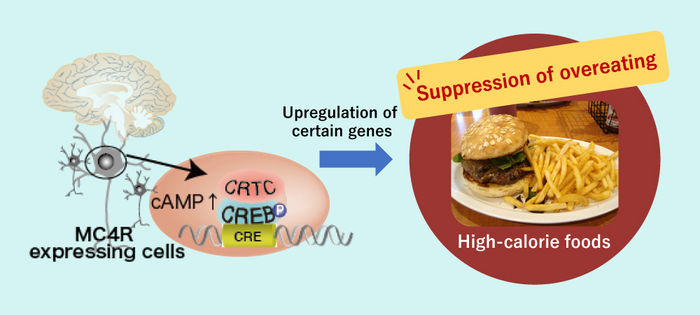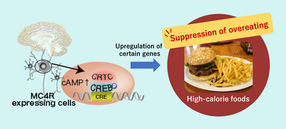Understanding the “eating just one potato chip is impossible” gene
Scientists reveal genetic mechanism associated with high-calorie food-fueled obesity
High-calorie foods—high in fat, oil, and sugar—can taste good but often cause overeating, leading to obesity and major health problems. But what stimulates the brain to cause overeating?

Symbolic image
pixabay.com

Osaka Metropolitan University scientists have revealed that the transcription cofactor gene CRTC1 mediates the obesity-suppressing effects of melanocortin-4 receptor (MC4R) by regulating appetite for fats and oils, high-fat diet metabolism, and blood sugar.
Shigenobu Matsumura, Osaka Metropolitan University


Recently, it has become clear that a gene called CREB-Regulated Transcription Coactivator 1 (CRTC1) is associated with obesity in humans. When CRTC1 is deleted in mice, they become obese, indicating that functioning CRTC1 suppresses obesity. However, since CRTC1 is expressed in all neurons in the brain, the specific neurons responsible for suppressing obesity and the mechanism present in those neurons remained unknown.
To elucidate the mechanism by which CRTC1 suppresses obesity, a research group led by Associate Professor Shigenobu Matsumura from the Graduate School of Human Life and Ecology at Osaka Metropolitan University focused on neurons expressing the melanocortin-4 receptor (MC4R). They hypothesized that CRTC1 expression in MC4R-expressing neurons suppressed obesity because mutations in the MC4R gene are known to cause obesity. Consequently, they created a strain of mice that expresses CRTC1 normally except in MC4R-expressing neurons where it is blocked to examine the effect that losing CRTC1 in those neurons had on obesity and diabetes.
When fed a standard diet, the mice without CRTC1 in MC4R-expressing neurons showed no changes in body weight compared to control mice. However, when the CRTC1-deficient mice were raised on a high-fat diet, they overate, then became significantly more obese than the control mice and developed diabetes.
“This study has revealed the role that the CRTC1 gene plays in the brain, and part of the mechanism that stops us from overeating high-calorie, fatty, and sugary foods,” said Professor Matsumura. “We hope this will lead to a better understanding of what causes people to overeat.”
Original publication
Other news from the department science

Get the food & beverage industry in your inbox
By submitting this form you agree that LUMITOS AG will send you the newsletter(s) selected above by email. Your data will not be passed on to third parties. Your data will be stored and processed in accordance with our data protection regulations. LUMITOS may contact you by email for the purpose of advertising or market and opinion surveys. You can revoke your consent at any time without giving reasons to LUMITOS AG, Ernst-Augustin-Str. 2, 12489 Berlin, Germany or by e-mail at revoke@lumitos.com with effect for the future. In addition, each email contains a link to unsubscribe from the corresponding newsletter.



























































